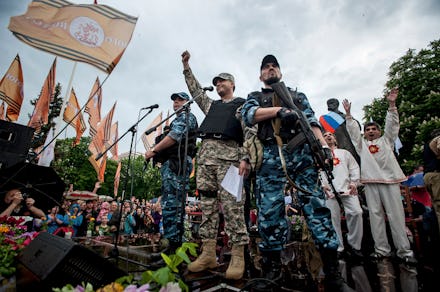Things in Ukraine Just Took a Wild Turn for the Worse

The news: On Monday, the eastern Ukrainian regions of Donetsk and Luhansk announced the results of the independence referendum they held a day earlier, and the outcome is exactly what you would expect.
According to representatives of the pro-Russian groups that organized the vote, 89% of voters in Donetsk and 96% in Luhansk voted to break away from Ukraine, reporting a 70% to 80% turnout. Both regions soon declared themselves sovereign people's republics, though they may not be completely independent for long.
"Based on the will of the people and on the restoration of a historic justice, we ask the Russian Federation to consider the absorption of the Donetsk People's Republic into the Russian Federation," separatist leader Denis Pushilin said at a news conference. Leaders from the Luhansk People's Republic also said they would consider holding a second referendum to determine whether the region should join Russia.
More problems in an already messy situation: Sunday's referendum was marked by violence as Ukrainian troops shot into crowds to break up the vote. Local politicians described these Ukrainian forces as "the occupiers," and have called upon Russian peacekeepers to stabilize the area. This is starting to sound like Crimea, isn't it?
Image Credit: BBC
The international response: Most of the international community has rejected the vote, which the EU called "illegal, illegitimate and incredible." Ukraine's acting president Olexander Turchynov said that voter turnout was much lower than what the separatists reported, and that "the farce that terrorist separatists call a referendum is nothing more than propaganda to cover up murders, kidnappings, violence and other serious crimes."
According to observers, the referendum was chaotic and, in many ways, downright illegal. Reporters say they witnessed the same people voting multiple times and organizers tearing up votes against secession, as well as heavily armed separatists patrolling several of the polling sites. "The voting took place in such a raw state of lawlessness that no one other than the organizers and perhaps their Russian patrons seemed likely to accept the results as a democratic expression of the voters' will," reports the New York Times.
Even the Kremlin, which recognized the results of the referendum, stopped short of welcoming these regions back to Russia's arms. "In Moscow, we respect the will of the people of the Donetsk and Luhansk regions and are counting on practical implementation of the outcome of the referendum in a civilized manner, without any repeat of violence and through dialogue," it said in a statement.
What will happen next? If this scenario feels too familiar, it's because it is. After a similarly dubious vote — which said 97% of people wanted Russian annexation — the Russian Federation welcomed Crimea into its ranks. However, leaked documents later showed that Russia's own government disputed this figure. Still, that didn't stop it from annexing the highly disputed peninsula.
But it might be harder to pull such a swift move in Donetsk and Luhansk. While they do have significant Russian-speaking populations, they don't constitute an overwhelming majority like in Crimea. And a new survey by Pew Research indicates that most people in eastern Ukraine actually don't want to secede.
Image Credit: Pew Research
Image Credit: Pew Research
Ukraine is planning on holding presidential elections on May 25, and secessionists in Donestk and Luhansk said they will block the vote in their respective regions. If they try that, another violent clash between separatists and government forces will be virtually unavoidable. And now it's becoming just a matter of time before Russia or other international forces try to step in and gain control of this spiraling situation.